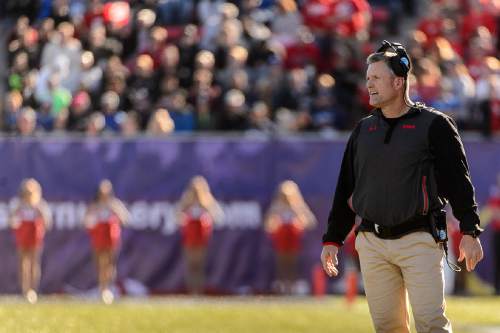This is an archived article that was published on sltrib.com in 2016, and information in the article may be outdated. It is provided only for personal research purposes and may not be reprinted.
On one of its most controversial issues, the NCAA is going to take a step back and reevaluate.
The NCAA's Board of Directors voted to rescind a ban on football satellite camps on Thursday, backing down from a Division I Council decision that would've kept college football coaching staffs from holding camps anywhere except their own facilities.
For in-state schools, the decision puts plans for out-of-state camps back on track. Utah put camps scheduled in Southern California, Houston and Dallas on hold, but now is marching forward.
"Everyone was on the fence in case this happened," said Pablo Cano, Utah's director of player personnel. "It shouldn't put us back too much. It's a good opportunity for kids who can't come see schools to meet coaches and be recruited."
BYU is expected to participate in camps in Texas and Hawaii, and Utah State will hold camps in the Salt Lake Valley.
The decision also shores up in-state camps, such as the All-Poly Camp held annually in Layton, which are annually staffed by Division I college coaches.
Since the ban passed the DI Council, Utah coach Kyle Whittingham was a vocal critic, citing the potentially damaging effect it could have for recruits who lack the ability to go on out-of-state visits and be seen by coaches who could offer a scholarship.
"When you take that away ... there's a lot of kids that will not be evaluated like they would otherwise because they can't get an airplane and go to five different camps during the summer," he said during a Wednesday Pac-12 conference call. "The only thing that matters is the best interest of the players."
The issue has been a thorny one dating to last summer, when Michigan coach Jim Harbaugh drew the ire of SEC schools by holding camps throughout the South, directly in the SEC footprint. The firestorm led the DI Council to vote to ban satellite camps on April 8 — a vote that fell into question when the Pac-12 and Sun Belt representatives were found to have voted against the direction of their conferences.
The first vote led Pac-12 commissioner Larry Scott to call out UCLA athletic director Dan Guerrero, the league's Council representative, for not voting "the way he was supposed to vote," after the Pac-12 had voted 11-0 (with an abstention) against the ban. UCLA Chancellor Gene Block represents the Pac-12 on the Board of Directors.
Other Pac-12 coaches manned the bully pulpit speaking out against the ban, notably Washington State coach Mike Leach declaring "I can't fathom anybody could be against satellite camps."
Added Leach: "The only way they could be against satellite camps is locking the other schools out of the opportunity to see their players. Every school that's against satellite camps needs to take comfort in the fact that, one, you wouldn't be against them if you're already in a pretty good recruiting area, and two, you can only sign 25 of them."
Scott lauded the NCAA's reversal on Thursday.
"We are pleased with today's decision by the NCAA Board to rescind the ban on satellite camps and ask the Division I Council to review the situation more broadly," Scott said in a statement. "This is the outcome our conference preferred, and we now look forward to working with the council to develop a more thoughtful and comprehensive approach to addressing football recruiting."
The Board of Directors also called for a holistic review of the recruiting process in the NCAA's release, which includes future changes the rules governing satellite camps and clinics.
ESPN reported that the ACC, which voted for the ban in the DI Council vote, was rescinding its own ban limiting its schools to holding camps within a 50-mile radius of their respective campuses.
Jay Drew and Steve Luhm contributed to this report.
Twitter: @kylegoon —
NCAA backs off satellite camp ban
• Board of Directors vote to rescind earlier Division I Council decision to ban satellite camps
• NCAA will review football recruiting process in the next year for future legislation
• Schools that had canceled camps or put plans on hold are now free to have satellite camps



